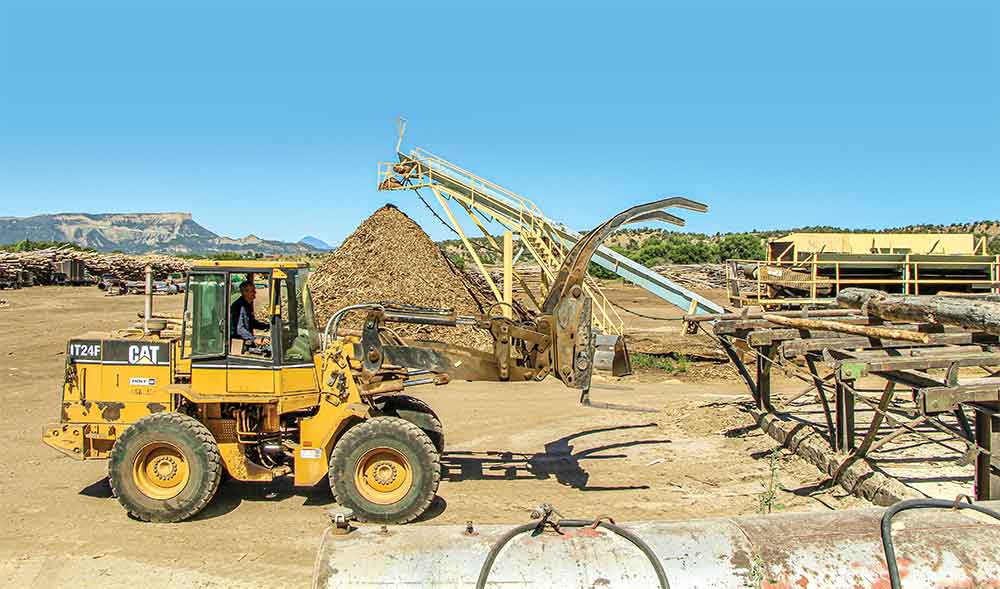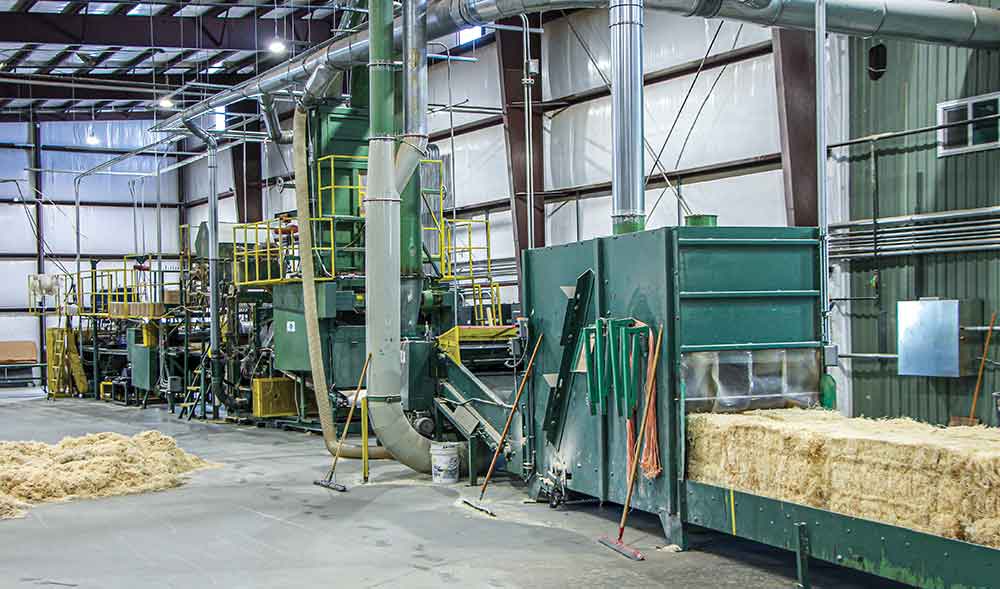Inside this issue
FROM THE EDITORS
COVER STORY
Pellets Make Sense For Aspen Wood Products
MANCOS, Colorado – Operating in remote southwest Colorado, Aspen Wood Products is diversifying its business base while expanding its capacity to handle green material with its new Mesa Verde Pellets operation.
Article by Dan Shell, Senior Editor, Wood Bioenergy
IN THE NEWS
- Drax Welcomes UK’s New Biomass Strategy
- Graanul Invest Gives Thumbs Up To UK
- Carbonity Venture Plans Biochar Mill
- Ryegate Promotes Wood Pellet Plant
- New Initiatives Helping Enviva
- California Tribe Develops Partnership
- Enviva Names New CFO
- Drax Announces Chief Sustainability Officer
- Conference Returns To St. Simons Island
- RoyOMartin Employees Better Themselves
- Maine Virtual Course Wants New Workers
- ALC-Idaho Reveals Insurance Plan
Asset Protection
EDITOR’S NOTE: The following companies submitted editorial profiles to complement their advertisements placed in the Wood Bioenergy October 2023 issue.
- Biomass Engineering & Equipment (BE&E)
- Clarke’s Industrial
- Fagus GreCon
- Flamex
- IEP Technologies
- Mid-South Engineering
- MoistTech
- NESTEC
PRODUCT NEWS
- Apprenticeship Program Starts Up At BID
- Delta Biofuel Teams With Player Design
- Bathan AG Appoints Streetz As CEO
- Valemt Will Supply Korean Power Plant
- Mississippi School Gets Deere Simulators
- Kirby-Smith Is New Morbark Dealer
- Joensuu Biocoal Plans New Facility
Find Us On Social
From the Editors
Biomass Politics: It’s A Boondoggle
Coming up on an election year, politicians like to start pointing fingers regarding a variety of topics. In the race for Governor of New Hampshire, biomass has come into the mix.
Democrats seeking election are calling out sitting Gov. Chris Sununu for ending a $200 million subsidy for ratepayers using the Burgess Biopower plant. What has really gotten lawmakers talking is a measure to forgive $70 million in “subsidies” paid by Eversource customers who paid higher prices for the electricity that was generated by the Burgess biomass plant.
The plant began operation in 2014, and until it was mothballed in 2021, operated consistently due in part to subsidies, most of which were vetoed by Republican Gov. Sununu, which were subsequently overridden by the State Legislature, controlled by Democrats.
In the latest veto message Sununu officially released, in mid-August, he reminds legislators of their previous bills giving more money to the Burgess plant, all on the promise that it would find a way to become solvent.
Saying in part, “It has now been five years…and the best idea brought forward to keep the plant going is to ask the state to forgive the approximately $70 million that the plant owes back to ratepayers. To sign this bill would continue to allow Burgess Biopower to collect millions of dollars in ratepayer subsidies every month with no hope of a solution and wipe out their debt obligation to our ratepayers.”
Democrats, some of whom are fighting for Sununu’s job, disagree. “I am disappointed by Gov. Sununu’s veto of this bipartisan bill that would ensure the continued operation of a renewable energy resource and keep jobs in Berlin,” Manchester Mayor Joyce Craig says on social media, who’s running in the Democratic primary for Governor.
From Left: Jessica Johnson, Managing Editor; Dan Shell, Senior Editor; Rich Donnell, Editor-in-Chief; David Abbott, Senior Associate Editor
Berlin Mayor Paul Grenier, where the plant operates, also a Democrat, has commented on his disappointment in Sununu’s veto pointing to the economic impact on the city. While State Senator David Watters, whose district covers Berlin, chimes in: “The vetoing of this bill will regrettably have a negative impact on the North Country, particularly Berlin, as well as ratepayers across the state, by putting the continued operation of the Burgess Biopower Plant in jeopardy.”
State Rep. Michael Harrington (R-Strafford), who sits on the House Science, Technology and Committee and is a former New Hampshire Public Utilities Commission member, claims that without massive subsidies the plant will never be able to run. He furthered his point by joking that he wants a subsidy for his “pineapple farm.” Obviously, one cannot grow pineapples in New Hampshire.
Time will tell what New Hampshire voters think about this boondoggle as they head to the polls in 2024. One thing is for certain, continuing to fail to realize the viability of biomass power sets the U.S. back in global comparison as nations around the world elevate the demand for industrial wood pellets, biomass electricity, and make moves toward complete carbon neutrality.
Pellets Make Sense For Aspen Wood Products
Article by Dan Shell, Senior Editor, Wood Bioenergy
MANCOS, Colorado – Operating in remote southwest Colorado, Aspen Wood Products is diversifying its business base while expanding its capacity to handle green material with its new Mesa Verde Pellets operation. The wood pellet mill utilizes residuals from plant operations to produce domestic fuel pellets and is a subsidiary of Aspen Wood Products, which produces excelsior, a specialty wood fiber. Both businesses operate at the same site in Mancos. An associated business, Aspen Wall Wood, operates an aspen sawmill and paneling plant in nearby Dolores.
Company President David Sitton purchased the excelsior plant in 2018, a year after a catastrophic fire that took it out of operation. Dating to the 1940s and ’50s when it was a match stick company, the mill was converted to excelsior production years ago and for years the mill provided a key market for short and small diameter timber in the area. When the Indiana-based owners decided not to rebuild the excelsior plant, Aspen Wood Products stepped in, bought the site and rebuilt the specialty fiber operation. The first bale of excelsior from the new facility rolled out in January 2019.
Today, the excelsior plant is a major supplier of the fibrous woody material that goes into cooler pads for evaporative coolers, and the company has now expanded its services in that market to include cooler pad manufacturing as well. The facility also produces erosion control products made of excelsior fiber.
Aspen Wood Products operates a major excelsior production facility, rebuilt after a 2018 fire, that’s been a fixture in the local log market for decades and is currently providing most raw materials for the pellet plant.
With its most recent move, the company has now added the new pellet plant business. This diversifies the Aspen Wood Products product line and also fills a key need in utilizing and monetizing the company’s residuals both at the excelsior plant and at the aspen paneling mill. The nature of the forest products industry and its infrastructure in southwest Colorado is such that there aren’t any large-scale chip or fiber consumers that become ready destinations for a mill’s residuals.
Want more content?
Wood Bioenergy is published and delivered 6 times per year to subscribers worldwide. Readership includes corporate executives, mill ownership, mill management, logging contractors and equity venture interests. Wood Bioenergy is FREE to qualified readers.
Latest News
Novo BioPower Gets Some Breathing Room
Novo BioPower Gets Some Breathing Room Novo BioPower CEO Brad Worsley says the Salt River Project and Arizona Public Service have signed contracts through 2033 to buy electricity generated by burning biomass. Snowflake biomass plant is the only one in the state large...
Novo BioPower Extends Key Arizona Power Contracts
Novo BioPower Extends Key Arizona Power Contracts Arizona’s only major market for pulpwood and biomass and a key part of the state’s forest health solution, Novo BioPower in Snowflake recently signed new 10-year power off-take contracts that allow the company...
Sponsored Content Provided By CPM Industrial Solutions
Turn Biomass Into Clean, Renewable Energy with CPM SPONSORED CONTENT PROVIDED BY CPM INUSTRIAL SOLUTIONSCPM is the world’s authority in biomass processing, with nearly 3,000 machines installed globally. Our biomass solutions create wood pellets, fire logs and...
Tigercat Triangulated Harvesting Head
Tigercat Triangulated Harvesting Head In late September 2023, visitors to the Pacific Logging Congress live demo event held in Washington got a sneak peak of the new Tigercat 573 harvesting head processing logs on the end of a Tigercat 875E logger. Since then,...
Titan Upgrades Tire Manufacturing Facility
Titan Upgrades Tire Manufacturing Facility Titan International (Titan) has completed a major upgrade to its manufacturing facility in Des Moines, Ia. The $2 million investment is part of Titan’s multi-year strategic capital plan and includes the addition of two new...
Major Carbon Offset Project License Revoked
Major Carbon Offset Project License RevokedEnvironmental officials in Indonesia recently revoked the license of one of the world’s largest carbon offsets projects, claiming the license-holder, PT Rimba Raya Conservation, transferred its license to a third-party...
Subscribe to Our Newsletter
Wood Bioenergy News Online hits the inboxes of subscribers in the wood-to-energy sectors.
Subscribe/Renew
Wood Bioenergy is published and delivered worldwide 6 times per year. Free to qualified readers in the U.S. Subscribers outside the U.S. are asked to pay a small fee.
Advertise
Complete the online form so we can direct you to the appropriate Sales Representative.




